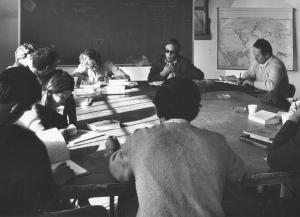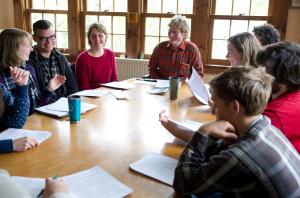Teachable Moments
To mark this 65th anniversary of the college, we checked under the hood of Marlboro’s legacy in the world of education—its pedagogical footprint so to speak. Here is what a few alumni, who themselves became teachers, have to say about how they learned what they learned at Marlboro, and how those lessons inform their teaching methods today.
 Dan Hudkins ’73 is the director of instructional technology and information technology service and support at the Harker School in San Jose, California, where he also teaches moral philosophy and coaches softball. “Education was certainly on my radar when I got to Marlboro, and I took a Philosophy of Education class from Geri Pittman during my freshman year, but I didn’t become an educator until 1994—21 years after I graduated.
Dan Hudkins ’73 is the director of instructional technology and information technology service and support at the Harker School in San Jose, California, where he also teaches moral philosophy and coaches softball. “Education was certainly on my radar when I got to Marlboro, and I took a Philosophy of Education class from Geri Pittman during my freshman year, but I didn’t become an educator until 1994—21 years after I graduated.
“The pedagogy used at Marlboro influenced my own teaching style enormously. Respect for the learner, high expectations and a willingness to follow where the student’s interests lead were all things I learned from people like Geri Pittman, Roland Boyden and Dick Judd. My favorite learning moment was writing a concluding paper for a Marxism and Existentialism class in the spring of 1970. John Woodland, Nan deVries, Pedie Parks and I spent an enormous amount of time upstairs in John’s room, all working at the same time, reading bits to each other, arguing and rewriting.
“My favorite thing about teaching is unquestionably the students. There are these moments in class when I know that a student’s prior assumptions are shattered around their ankles and they have to start trying to understand themselves and the world from another perspective.
“Marlboro prepared me best by making me a fearless thinker and giving me the sometimes naive assumption that I could learn almost anything. I always begin with the idea that if I don’t understand or can’t figure it out, I will if I keep working at it.”
Arleen Tuchman ’77 is a history professor at Vanderbilt University, where she has been teaching since 1986. “When I went to graduate school to study the history of science and medicine, my goal was to teach at a liberal arts college. I’m not sure I imagined myself at a place as small as Marlboro, but I definitely wanted a position at a school that cared about teaching students to think critically, to express themselves clearly and to write well.
“My experiences at Marlboro definitely shaped my understanding of the liberal arts and influenced the way I engage my students in the classroom. I enjoy seminars the most because I love to see students get excited about ideas. Although I am clearly more knowledgeable than my students, I see my role as more akin to a facilitator, encouraging students to engage with texts and develop their own well-grounded analysis of the content.
“I fondly remember doing an independent study with Bob Engel on endocrinology. We would sit outside on the grass and I would ‘teach’ Bob what I had learned while he posed questions. I loved the reversal of roles and the relaxed nature of the exchange. Dick Lewontin came to Marlboro to teach population biology, and I’ll never forget his attempt to enact the concept of random genetic drift: he pushed his stomach out, rearranged the buttons on his shirt so they were in disarray, lowered his glasses to the tip of his nose and proceeded to stagger around in front of the class.”
John Gilliom ’82 is a professor of political science at Ohio University, where he has been teaching for 21 years and associate dean of the College of Arts and Sciences. “My Marlboro experience made me want to be both a college professor and an amateur farmer. During the school years, I worked with Dick Judd on the arts of history and writing. During the summers, I worked with Sue Judd as her garden assistant and rototiller pilot. I now teach by day and farm by night. My university colleagues all find it rather bizarre, but I like to think that anyone from Marlboro would understand just fine.
“It’s impossible to make the pedagogical magic of Marlboro work at a 30,000-student university with classes ranging from a tiny 25 up to a few hundred. But there are a few things that can be drawn upon. Informality. Accessibility. Plain speech. Faith in the need for individuals to find their own way. And, of course, to this day, I believe that clear writing is the foundation of a college education.
“On a clear, warm, April day in my freshman year at Marlboro, I opted to skip my American Political Thought class to join nearly every other student in an impromptu springfest. I was dozing in the sun when an improbable cloud blocked the warmth. I opened my eyes to look up at the bowtie, pipe, tweed jacket and bushy eyebrows of professor Judd, who said, ‘I just wanted to make sure that you were okay.’ Then he simply grunted and walked away. It was the last class that I ever skipped. Care matters.”
Jake Dalton ’92 is an assistant professor of Tibetan Buddhism at University of California, Berkeley, where he has been teaching for three years. “Marlboro allowed me to develop my interests in Buddhist studies in ways no other college would. Working so closely with Jet Thomas and Birje Patil, reading texts side by side in their offices, taught me how to really read, how to let go of my own narcissistic concerns, leap into the text and allow it to transform me.
“The Plan of Concentration gave me the freedom to explore and was fundamental to building my confidence so that I could succeed in graduate school. Already on day one of grad school, I was way ahead of many of my peers, as I knew how to conduct research and write in a sustained way.
“There are two approaches to education. The first involves the student disciplining him or herself to work hard, the second involves the student finding what she or he loves and playing in it. Of course the latter is the ideal, and Marlboro supports its students to follow this path, to discover what they love and explore it in their own way. In my own teaching, I try to offer my students the same kind of open support, allowing them to find their own ways yet being there to help whenever they need it. It can be risky, as some may not find their way, but Marlboro taught me it is worth it.”
 Barbara Whitney ’97 is the director of theater at Pingree School in South Hamilton, Massachusetts. “In many ways, Marlboro ruined me for subsequent educational experiences. I continue to marvel at the institution’s ability to be flexible in response to myriad situations as well as securely committed to a particular identity. Marlboro showed me that it’s possible to have a community of curiosity-driven, passionate learners who are supported by a community of curiosity-driven, passionate leaders.
Barbara Whitney ’97 is the director of theater at Pingree School in South Hamilton, Massachusetts. “In many ways, Marlboro ruined me for subsequent educational experiences. I continue to marvel at the institution’s ability to be flexible in response to myriad situations as well as securely committed to a particular identity. Marlboro showed me that it’s possible to have a community of curiosity-driven, passionate learners who are supported by a community of curiosity-driven, passionate leaders.
“Marlboro teachers generally practiced a mindset of respecting students and recognizing that student and teacher were together on the same path—sometimes at different places, but the same path. What forged the bond was asking questions, arguing, practicing, reflecting and sharing insights and personal experiences.
“Real learning can feel unsafe. It knocks up against assumptions and clichés, stereotypes and laziness. As a teacher I have to keep asking more questions rather than delivering answers. I have to believe that the classroom exists in order to serve communication, connection and discovery. My students have to know that I care about them, that I see them and that I will do whatever I can to cultivate the relationship and the environment so they can feel safe to question and discover.
“I think about Marlboro almost every day, little flickers of memory as I weave through clumps of students in the hall, hearing bells and lockers and the incessant tide of adolescent chatter. I try to bring a little of it with me, little threads of Vermont grace.”
Nate Totushek ’07 just finished his second year as chemistry teacher at School One in Providence, Rhode Island. “It’s a small, arts-oriented high school with a nice, cozy student-faculty ratio. This allows us to explore some of the deeper questions, like ‘What is empty space made of?’ I spent a year as a fulltime teacher in New York City before coming here, and it’s interesting how I am now in a place where I can combine the barefoot expeditionalism of Marlboro’s approach with the slick, cold steel of urban factory schooling.
“Teaching keeps me sharp, learning stuff I should have learned in high school. It also gives me a place to practice my stand-up routine and magic tricks. But education is far from being my ‘profession’; this was a revelation that I came to while studying education at Marlboro. A school needs a positive, slightly anarchistic presence or kids are likely to enter adulthood with a chip either on the shoulder or in the brain. Not sure which is worse, but at any rate schools are where society is designed, so I appreciate the Marlboro approach: It’s your education, take it or leave it.
“One thing that was extremely motivating at Marlboro was the feeling that nobody else was going to care whether I completed a project. This gave me a tremendous sense of ownership over my successes, because I had nobody else to blame for my failures. Perhaps it’s not the fastest way to skin a cat, but in many ways it’s the most thorough.”
